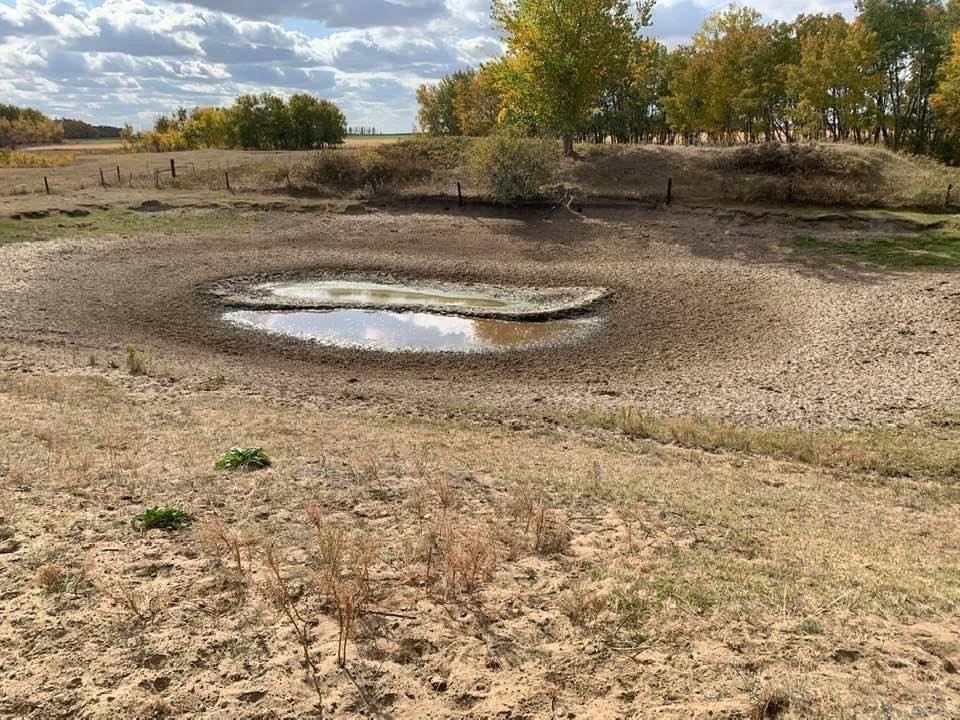Ranchers Should Consider Water Supply in Drought Plan
Access to good-quality water can be a challenge during a drought.

The water in this dugout is low because of drought conditions. (NDSU photo)
Access to good-quality water is one of the limiting factors in most grazing systems.
“During drought, this becomes an even greater challenge as water sources become low, creating water shortages and potential for toxicity,” says Miranda Meehan, North Dakota State University Extension livestock environmental stewardship specialist.
“Providing adequate, safe water to livestock is critical for animal health and production,” she adds. “A 10% loss of body water is fatal to most species of domestic livestock. Water accounts for more than 98% of all molecules in the body and between 50% and 81% of an animal’s total body weight at maturity.”
Join NDSU Extension specialists for a discussion on water supply and quality during drought as part of the Preparing Your Ranch for Drought webinar series on March 4 at 1 p.m. Central time. To register, go to https://www.ag.ndsu.edu/drought.
The amount of water livestock need depends on the type of animal and stage of production, with requirements often doubling during hot weather. The general estimates of daily water intake for beef cattle when the temperature is 90 F are:
- Cows - 18 gallons for nursing calves; 15.3 gallons for bred dry cows and heifers
- Bulls - 20 gallons
- Growing cattle - 9.5 gallons for a 400-pound animal; 12.7 gallons for a 600-pound animal; 15 gallons for an 800-pound animal
- Finishing cattle - 14.3 gallons for a 600-pound animal; 17.4 gallons for an 800-pound animal; 20.6 gallons for a 1,000-pound animal; 24 gallons for a 1,200-pound animal
“As you develop your drought plan, it is critical to include strategies to ensure livestock have adequate, good-quality water,” Meehan says. “Short-term solutions include hauling water, using temporary pipelines or portable tanks.
“Make sure adequate tank storage is available, and you have clean equipment for hauling water and a reliable water source,” she advises. “While these are short-term fixes, they can get you through a drought.”
She recommends producers consider installing water developments to increase their drought resilience in the long term. Water developments are one investment that gives producers the most bang for the buck. Common water developments include troughs, pumps, wells and pipelines.
Many cost-sharing opportunities are available to producers for installing water developments through agencies and organizations including the Farm Service Agency, Natural Resources Conservation Service, soil conservation districts and conservation groups.
“When thinking about water developments, also consider the importance of maintaining an ample supply of good-quality water for cattle during the heat of the summer,” Meehan says. “Heat stress can have major impacts on cattle productivity and can be life threatening. Evaluate your water supply lines and ensure you have sufficient water pressure and flow capacity to keep troughs full during times of peak water consumption.”
Improving livestock’s access to good-quality water not only increases the drought resilience but can expand grazing options. Water developments in spring and summer can improve grazing distribution because livestock tend to congregate near water sources.
Distribution and utilization can be improved further by cross-fencing to create additional pastures in a grazing system. Installing livestock watering sources in cropping systems allows producers to utilize crop residues and cover crops for forage.
Through time, these improvements, combined with appropriate management, have the potential to increase the carrying capacity of an operation, allowing for an increase in herd size and/or increased drought resilience with stockpiled forages.
NDSU Agriculture Communication - Feb. 5, 2021
Source: Miranda Meehan, 701-231-7683, miranda.meehan@ndsu.edu
Editor: Ellen Crawford, 701-231-5391, ellen.crawford@ndsu.edu
